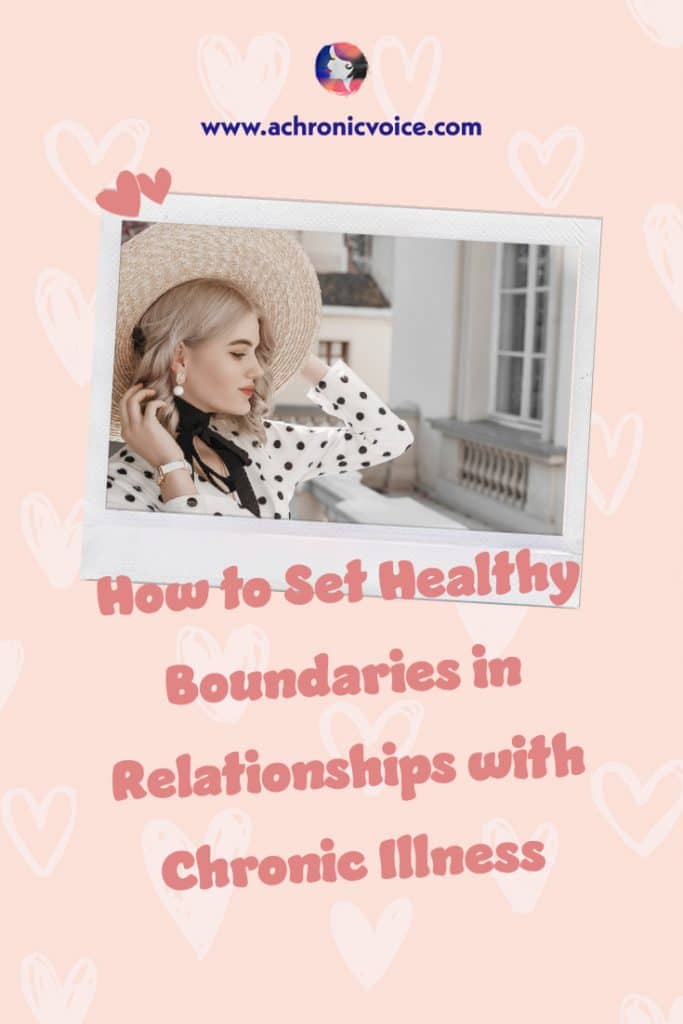We haven’t had a guest blogger in a while, so I’m happy to have Lydia with us today! Lydia lives with chronic migraine, Fibromyalgia and C-PTSD. Today she shares with us her tips on setting healthy boundaries in all sorts of relationships, when you live with chronic illness. Let’s hear what she has to share today!
Table of Contents
Healthy Boundaries are Especially Crucial When You Have a Chronic Illness
It’s no secret that healthy boundaries play an important role in our relationships, whether it’s romantic, platonic or familial. This is especially true when you live with an energy-limiting chronic illness, and want your relationships to thrive.
We see the importance of healthy boundaries echoed on social media in the form of memes, posts and comments. Medical professionals and even our own therapists place emphasis on it as well.
As a person who faces daily struggles with chronic illness, I know how true that can be. My health and well-being depends on me taking care of myself. I have to save my energy for the things that matter most to me. This is on top of the essential tasks I need to do.
Here are a few lessons that I’ve learned on my journey with chronic illness and setting healthy boundaries. I hope that they come in handy in helping you to navigate your own life with your loved ones. Always remember: healthy boundaries allow us to live our best and fullest chronically ill life.
1. Know Your Own Limitations with Chronic Illness
I’ve undergone a lot of trial and error to understand my limitations. I’ve experienced burnout and flare ups from chronic illness far too often, by trying to do All The Things too quickly.
Coming to terms with my limitations has changed my life for the better. I had to examine where my energy was going, and then watch for patterns. And they appeared.
Soon it became clear that I needed to say “no” more often than I was comfortable doing so with the people in my life. For example, I couldn’t always hop in the car and spend an evening out, if I was already feeling extra fatigued. Healthy boundaries start with knowing what our limitations are, and respecting them.
2. Be Your Own Advocate & Communicate Your Needs in All Your Relationships
Speaking up for myself was very difficult at first, as I didn’t want to burden those in my life with my needs. I’ve always been self-conscious about needing assistance or space. I worried that my family, friends or partner would interpret that as disinterest on my part in making memories together with them.
But what I’ve learned, and am still learning, is that speaking up and sharing your limitations with them is vital to healthy living. Setting healthy boundaries and sharing them with my loved ones have ultimately resulted in more quality time.
So do share with your family that you need to take a day off to simply rest. Let your partner know that you need a low-key date at home, where Netflix and the couch are the main attractions. Vocalise when you need a break from your friends.
The people in our lives want to support us. Sometimes all it takes is simply to let them know our boundaries so they can do just that.
3. Be Upfront & Set Healthy Boundaries with the New People in Your Life
Only you know when the right time is to tell someone new in your life that you have chronic illness. Chronic pain, fatigue, brain fog and a body with unpredictable energy levels are part and parcel of my everyday life.
When I’m on an outing with a new friend or date, that could mean that I suddenly need to rest. While I do share that I have health issues, I usually try to hide it at first.
I’ve learned to be upfront about my limitations by passing up on some invitations, and this has helped me a lot. I take time to rest up on the bad days, so that we can enjoy our time together on my better days.
4. Stick to Your Medical Appointments
This may seem like a no-brainer for most people, but life gets complicated. Sticking to the neverending medical appointment can be a chore.
Create healthy boundaries to stick to these appointments, even if your presence is suddenly demanded by others. This can go a long way in improving your quality of life with chronic illness.
For me, medical appointments mean keeping myself up to date about the status of my chronic illness. I also use this time to share any concerns I may have with my doctors. I need these information and knowledge to live my best life with chronic illness.
5. Prioritise Yourself & Focus on Self-Care
Making yourself a priority is important whether you live with chronic illness or not, and has a positive impact on your relationships, too.
When we are at our best, we can be more present for the good moments in life. Chronic illness has a way of complicating things, so prioritising our needs is crucial. We should never feel guilty about doing so.
Self-care looks different for everyone, but the essence of it remains the same. They are often small acts that we do for ourselves so that we can rest, recharge and recover.
Self-care also includes setting healthy boundaries. Perhaps you need to cut off a toxic friend who only wants to whine about their problems, and ignores your pain and need for rest. Or maybe you need to draw a line with a certain family member who keeps giving unsolicited health advice.
Self-care is a gift that you give to yourself. This isn’t limited to the bad days; it can also be a guilt-free treat on your better days!
6. Respect Your Chronic Illness Journey
It’s important to respect how far you’ve come and where you’re going on this journey. Chronic illness can complicate life in a way that only others with it can understand. But our lives can still be beautiful, unique and worthy.
For this to happen, healthy boundaries need to be part of our life strategy with chronic illness. These boundaries may change over time depending on the fluctuations in our disease activity, so it is crucial to listen to our bodies.
We should never allow others to discredit our chronic illness, needs or journey. As humans we can be our own worst critic, yet we also have the potential to be our own best advocate. Look back at how far you’ve already come, and never forget your strength and resilience.
*Note: This article is meant for educational purposes and is based on the author’s personal experiences. It is not to be substituted for medical advice. Please consult your own doctor before changing or adding any new treatment protocols.
If you liked this article, sign up for our mailing list here so you don’t miss out on our latest posts! You will also receive an e-book full of uplifting messages, quotes and illustrations, as a token of appreciation!
Pin & Help to Share the Post!

Contributor Bio




I’m constantly making boundaries clear to my friends and family. My friends get it, but family – not so much. Never mind my employers. It’s hard out there when you have a chronic illness, especially when it’s not seen as one by others.
I hear you. Family is a different beast altogether since you’re bonded by blood and they know where it hurts most to cut. Sending gentle hugs.
Thank you, really helpful x